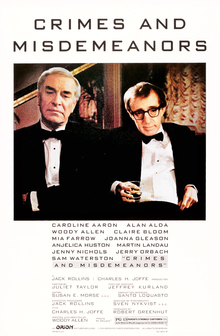Woody Allen's admiration of Ingmar Bergman's films is so well known that it becomes a gag in
Manhattan when, at their first meeting, Mary (Diane Keaton) gives Isaac (Allen) a list of artists she thinks are overrated, concluding, to his astonishment, with Bergman. But
Manhattan reminds me less of Bergman's films than of those of the French New Wave. Maybe it's just because I've seen several of them recently, but it strikes me that, other things being equal,
Manhattan could add a seventh to Eric Rohmer's
Six Moral Tales. In
Claire's Knee (1970), for example, the middle-aged Jerôme (Jean-Claude Brialy) is inspired to lust by the eponymous joint of the teenage Claire (Laurence de Monaghan). In
My Night at Maud's (1969), the middle-aged Jean-Louis (Jean-Louis Trintignant) marries the much younger Françoise (Marie-Christine Barrault), and 20-year-old Haydée (Haydée Politoff) is the object of desire for both Adrien (Patrick Bauchau) and Daniel (Daniel Pommereulle) in
La Collectionneuse (1967). Allen carries the premise further in
Manhattan by making 42-year-old Isaac and 17-year-old Tracy (Mariel Hemingway) lovers. Is it too much to say that Allen may have found license in Rohmer's films for their somewhat shocking relationship? But
Manhattan also features a familiar triangle present in several New Wave films: two men in competition for a single woman. Isaac and his friend Yale (Michael Murphy) both get involved with Mary, just as Adrien and François were involved with Haydée, and more famously, Jules (Oskar Werner) and Jim (Henri Serre) fall in love with Catherine (Jeanne Moreau) in François Truffaut's
Jules and Jim (1962). Similarly, both Franz (Sami Frey) and Arthur (Claude Brasseur) pursue Odile (Anna Karina) in Jean-Luc Godard's
Bande à Part (1964), and Paul (Jean-Claude Brialy) and Charles (Gérard Blain) contend for the affections of Florence in
Les Cousins (Claude Chabrol, 1959). Allen's celebration of New York City also reminds me strongly of the way Godard pays homage to Paris in
Breathless (1960) and Chabrol has Paul give Charles a tour of the city in
Les Cousins. Of course, no New Wave film was filled with wisecracks and one-liners the way
Manhattan is. (Not that any Bergman film is, either.) Yet I think it's not too far-fetched to think of Allen's movie as a kind of
hommage to Rohmer, Godard, Truffaut, Chabrol,
et al. And if it is an
hommage, it is often a handsome one, thanks to Gordon Willis's magisterial black-and-white cinematography and the wall-to-wall Gershwin soundtrack. Allen's personal life has made us more queasy about
Manhattan's May-December (or at least April-September) relationship, though I'm not sure audiences ever found Isaac and Tracy a normative couple.






